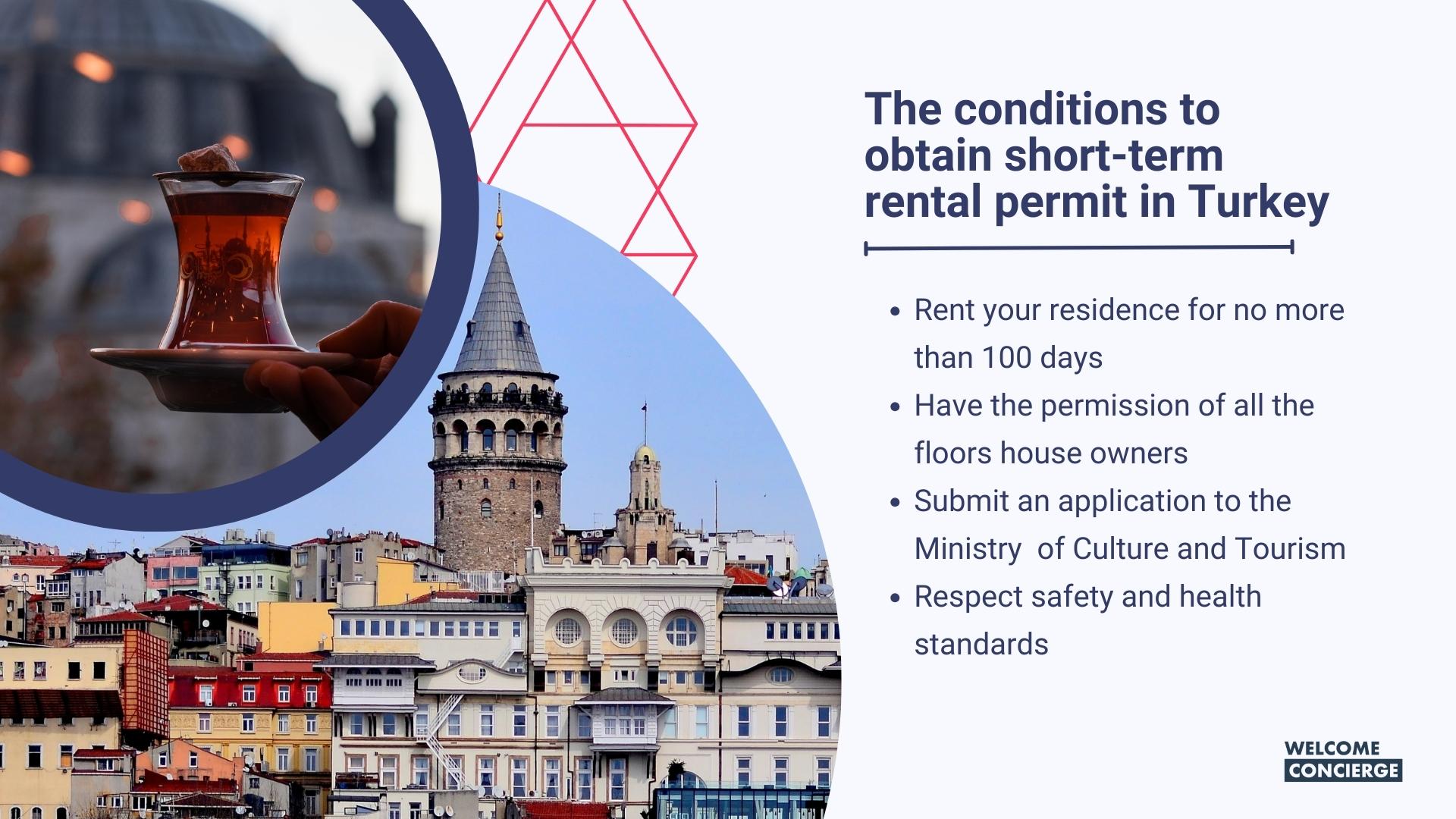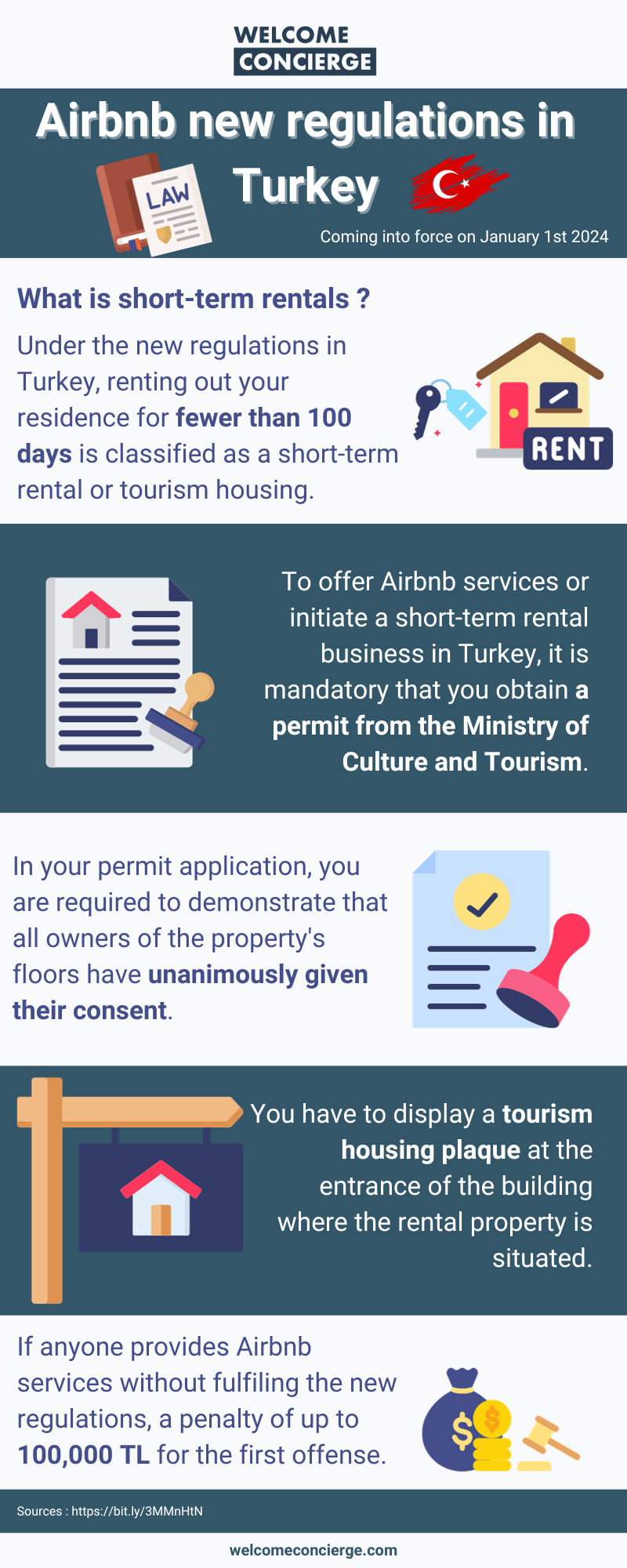Along with the boom in short-term rentals for tourism purposes in several countries around the world, and the expansion of Airbnb users, the authorities decided to update the laws governing this type of activity. In this context, Turkey has decided to issue new laws to regulate short-term rentals better. Draft 7464, entitled “Law on the Tourism-Purposed Leasing of Residences and Amendment of Other Laws,” was published in the Turkish Official Gazette on November 2, 2023.
In this article, we share what’s new for Airbnb in Turkey. We’ll review the various requirements, including the tourist residence certificate, as well as the administrative penalties for non-compliance with these new rules.
The legal scope of new regulations for short-term rentals
Before we dive into the new regulations, it is important to know in which cases they are applicable. The 7464 law considers short-term rentals when the rental’s duration doesn’t exceed 100 days. Thus, long-term rentals are excluded from the scope of the new regulations.
However, if a landlord rents out their property for more than 100 days on more than four occasions within a year, it is seen as an attempt to circumvent the law, and in such cases, a fine of one million Turkish Lira is imposed.
The mandatory permit for Airbnb in Turkey
Airbnb’s new regulations require the property owner to obtain a permit before proceeding with any short-term rental for tourism purposes. This permit also known as Tourism Residence Certificate is delivered by the Turkish Ministry of Culture and Tourism.
Who needs the permit to provide Airbnb services?
Every person who intends to rent his or her property for short-term and tourism purposes needs to apply for a permit. Without it, the lessor risks severe penalties. To obtain this permit, the owner must apply to the Ministry of Culture and Tourism and respect several conditions.
The permission of all proprietors as a condition to obtain the permit for Airbnb services
If the property to be rented is located within a building, the owner must have the permission of all the proprietors, and he has to justify their approval inside his application. This regulation has been added to make sure the property is suitable for short-term rentals. It also helps make sure the Airbnb clients do not cause any damage that may affect the neighbors during their stay.
For individual properties such as villas, it is not required to have the approval of the neighbors.
The application for the permit requires documents that confirm the property to be rented respects safety and health standards.
The permit will probably have a validity duration and will need to be renewed through another application. The validity period is not yet specified.

A tourism housing plaque among the new regulations for Airbnb in Turkey
According to the new regulations, the lessor has to display a tourism housing plaque at the entry of the building where the property to be rented is located.
The owner of the property is the only person who can apply for the permit for short-term rentals.
The users of Airbnb services are not allowed to rent the house of the proprietor who has the permit, to third parties. It is prohibited to rent this residence on their name for tourism purposes.
Administrative sanctions for illegal rental activities
The new regulations also specify the sanctions and penalties that are encountered if the requirements are not respected.
The first sanction occurs if a lessor provides Airbnb services without having the permit or the Tourism Residence Certificate. The law imposes a penalty of up to 100,000 TL for the first offense and up to 1,000,000 TL if the person practices short-term rentals without the certificate several times.
The second sanction is imposed if the tourism housing plaque is not displayed at the entrance of the building. The penalty is 100,000 TL for the first time and can reach 500,000 TL if the same offense is repeated.
In which cases the permit can be canceled?
The permit of the Tourism Residence Certificate is apparently canceled if the homeowners do not respect the Airbnb regulations stated in the 7464 law. Here are the main situations where the permit is no longer available :
- If the permit holder requests its cancellation
- In case the Airbnb services are no longer provided by the homeowner
- If the lessor fails to fulfill the obligations for Airbnb services in Turkey
- If the residence rented for tourism purposes undermines public order and security
You may be wondering what would happen to the tenants if the permit were to be canceled before the end of the rental period. Well, the new regulations allow the tourists to stay in the residence until the end of the lease contract.

Airbnb new regulations in Turkey: Bottom Line
After reading all these new requirements, you may be wondering whether you can still provide Airbnb services with your property. Well, the answer is yes, as long as you fulfill the new regulations and all the applicable local rules regarding short-term rentals for tourism purposes.
If you’re looking for property management professionals in Turkey, book an appointment by filling out the short form and we will take care of your request and help you increase your short-term rental earnings.
FAQ
When the new regulations will come into force?
The new regulations come into force starting from January 1st, 2024.
Do I need a permit for Airbnb in Turkey?
Yes, anyone who wants to proceed with short-term rentals (up to 100 days) needs to apply for the permit required by the new regulations.
What happens if I fail to comply with the new Airbnb regulations?
Non-compliance with the new regulations can result in administrative sanctions, which include fines that can reach 1,000,000. And in case of several offenses, the permit can be canceled and the activity suspended.



